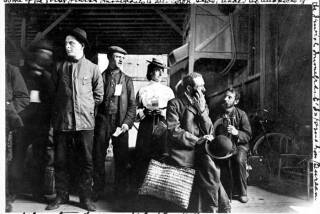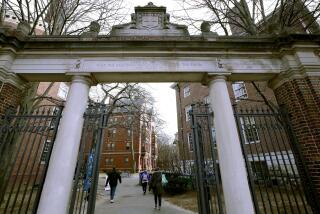Refusenik on Pitzer Staff, but Soviets Won’t Let Him Out
- Share via
“Benjamin Charny, visiting fellow in mathematics, Ph.D. Moscow University, U.S.S.R.,” says a new listing in Pitzer College’s fall handbook, as if the Russian professor’s presence at the Claremont college were an established fact.
Although Charny accepted a teaching fellowship at Pitzer during an emotional telephone conversation with college officials and students in May, he is still awaiting documents that will allow him to leave the Soviet Union.
During the past nine years he has become a well-known refusenik among the thousands of Soviet Jews seeking refuge in the United States.
Kathleen Lang, human rights officer for the U.S. State Department, said Soviet officials have indicated that Charny may be permitted to emigrate in the middle of the month.
The mathematician, who is 51, will be given immediate medical treatment for a heart condition and skin cancer, a family spokesman said. Then plans call for him to begin his fellowship at Pitzer.
“We’re just overjoyed,” said Alfred Bloom, Pitzer’s vice president for academic affairs, who officially offered Charny the fellowship.
The college’s action, Bloom said, was instigated by Pitzer student David S. Straus, 20, of Encino. Bloom and Jewish leaders credit Straus with interesting the students in Charny’s case and urging the college to make its offer.
“David’s role was absolutely central,” said Bloom, who called the job offer to Charny “a symbolic act of educational value. We are a school devoted to international understanding, and we can help him.”
“Pitzer is the only college we know of to take this kind of action, stemming from students,” said Bill Livingston, press secretary for Sen. Pete Wilson, who has worked on behalf of many refuseniks.
Bloom said Charny will be given an office and use of the college’s facilities and staff, and will probably be asked to lecture.
USC sent two university representatives to Russia in 1983 to offer jobs at several universities throughout the United States.
Straus, who is majoring in psychology, said his interest in Soviet Jewry began when he was in high school in Sherman Oaks.
He said he became aware as a teen-ager that Jews in the Soviet Union have been denied the right to study their culture and their ancestral language. After learning of refuseniks who were imprisoned for trying to leave, he said he became convinced that the Soviet Union could be pressured into changing its policies.
Soon after he entered Pitzer in 1986, he and another student, John Rudnick, organized Students Concerned for Soviet Jewry, which he said now includes several hundred students from all five of the Claremont Colleges.
In his second year, Straus said, “my goal was to get the school to invite a refusenik to actually come here to teach.”
Straus said he and Rudnick learned of Charny from Victor Kipnis, a Soviet mathematician and former refusenik who joined the USC faculty in 1986. Kipnis said Charny’s poor health was an important factor in trying to get him out of the Soviet Union.
“He’s dying because he can’t get proper treatment in Russia, but he can here,” Straus said. “The way I feel is that if we do not make an uproar, people will forget them (the refuseniks), and they will continue to be persecuted.”
After the students focused on Charny, Straus said, the Pitzer Faculty Executive Committee and College Council approved Charny’s hiring.
The college telephoned its offer to Charny on May 12, making the call in a faculty office filled with cheering students.
“I am really excited and moved,” Charny said during the conversation, which was amplified so that everyone could hear. “But first, two things are necessary. The first is to get out, and the second is medical treatment. I am delighted to accept your invitation. The best is fulfilled. Thank you, thank you,” he said, in slightly accented English.
Anna Charny Blank, the mathematician’s daughter, who lives in Boston, said: “David Straus has displayed tremendous involvement in helping my father. He has amazed me with his dedication. We have never met, but I think he must be a wonderful man.”
Ellen Rabin, director of the Commission on Soviet Jewry of the Jewish Federation Council of Greater Los Angeles, called Straus “an example of grass-roots activism who deserves a great deal of credit.” She added, “We hope he will act as an example for other students.
“Charny is loved greatly by the refuseniks. People who were out (of Russia) couldn’t help but think of him and work on his behalf.”
Charny, according to a “Refusenik Profile” provided by the Soviet Jewry Research Bureau, applied to emigrate in 1979 with his brother, Leon. Leon was permitted to leave and is a graduate student at Massachusetts Institute of Technology. Anna Charny, also a mathematician, her husband, Yuri Blank, and their baby daughter, Simcha were allowed to leave in August, 1987.
Charny and his wife, Yadviga, a metallurgical engineer, were never told why their application to emigrate was refused, Blank said. Both lost their teaching jobs at the University of Moscow after their application for visas, which happens to about 90% of the refuseniks, Rabin said.
She said her organization is excited about what Pitzer is planning. “Those are special people, who impress us with their caring for someone they’ve never met.”
More to Read
Sign up for Essential California
The most important California stories and recommendations in your inbox every morning.
You may occasionally receive promotional content from the Los Angeles Times.










